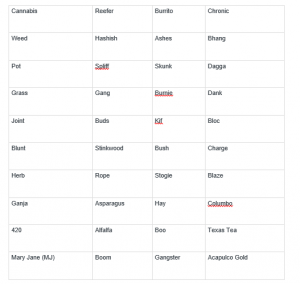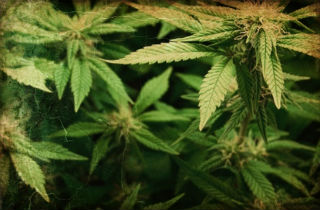Marijuana is Super Popular!
Marijuana is one of the most widely used drugs in the world. In the US, the recent push to legalize marijuana as well as it use as a medicinal agent have led to a much greater acceptance of the drug among both adolescents and adults.
Changing perceptions of drug use have resulted in many viewing marijuana as non-addictive and less harmful than other drugs. Consequently, many people use it as a means to get high with relatively little risk of overdosing or death. However, while there’s low likelihood of dying from marijuana use alone, the drug is hardly harmless. Marijuana is known to impact a person’s judgment and perception and it can also be addictive. Additionally, both short and long-term use can contribute towards various health and social complications.
Marijuana’s Street Names and Nicknames
Thanks to its worldwide popularity, marijuana has garnered plenty of nicknames and street names. Slang scholar Jonathon Green estimates there are at least 1,200 slang terms referring to marijuana, probably ranking it as the drug with the highest number of alternate names.
According to Green, the illegality of the drug necessitated the need for the terminology related to it, especially among young or underage users who needed a way to hide it from adults or authority. As the use of one slang word became more commonplace, with the majority of the population wising up to its meaning, a new one cropped up to replace it.
Furthermore, marijuana has been used in various cultures for centuries and it’s inevitable that the wide variety of people using it across the world would come up with different words for it. Other names were coined in reference to its quality, effects or popularity.
Here are some common synonyms for marijuana. Keep in mind that the names are ever changing and vary depending on a country, region or age-group so this is list is by no means all-inclusive.

Teen Marijuana Use and Misconceptions
As mentioned earlier, marijuana is widely abused by both teens and adults. Parents should, therefore, be on the alert as hearing their teens use any of the above nicknames might indicate that they are exposed to or using marijuana.
The recent public debates about legalization and the use of medical marijuana have led to a reduced perception of the drug’s harmful effects, especially among teens. In fact, according to the 2017 Monitoring the Future (MTF) survey, daily marijuana use has exceeded daily cigarette use among 8th, 10th and 12th graders. Further statistics reveal that a whopping 71% of high school seniors do not view regular marijuana smoking as being very harmful. Some among those polled perceived marijuana as not harmful because it is “natural”.
Different routes of recreational marijuana use among teens include
1. Smoking: Teens mainly smoke hand-rolled cigarettes (joints) or cigars (blunts). Many also use glass or water pipes (bongs) to smoke the drug.
2. Ingestion through edibles: Marijuana can be cooked into different foodstuff known as edibles. The most common edibles are cakes, cookies, brownies or candy.
3. Vaporizing: Those who want to avoid inhaling smoke can decide to use vaporizers. These devices heat and pull the drugs active ingredients into the vapor or heat a liquid marijuana extract into vapor which is then inhaled.
Signs of Marijuana Use
There are some signs to look out for if you suspect your teen is using marijuana including:
Personality changes:
- Lethargy and continuously slacking off
- Slower reaction times
- Paranoia
- Change in mood becoming more irritable or anxious
Physical changes:
- Changes in sleeping patterns-continuously sleeping in late or sleepless nights
- Changes in appetite
- Disorientation
- Dry mouth
- Changes in speech
- Trouble focusing on tasks or remembering things
- Bloodshot eyes and dilated pupils
- Increased nausea or vomiting especially after hanging out with friends
Social and academic changes:
- Inexplicably changing their group of friends and hanging out with them more than usual
- Breaking curfew
- Declining academic performance
- Increased fascination with drug use and paraphernalia
- Increased secrecy about their social media activities
Effects of Long-term Marijuana Use
Prolonged use of marijuana has been linked to various psychosocial, physical and mental health risks. Adolescents are especially more vulnerable to the long-term effects of the drug since their brains are still developing. Research shows that heavy cannabis use by young people can disrupt the development of neurological pathways in the brain, interfering with memory and the IQ.
Other long-term health effects include:
- Suppressed immunity
- Respiratory inflammatory symptoms from smoking it
- Decreased testosterone in men
- Increased prolactin in women
- A wide range of withdrawal symptoms should one stop using marijuana.
Addressing Marijuana Abuse with Teens
Given the changing attitudes about marijuana use, coupled with the statistics of increased use among teens, it is imperative that adults initiate a conversation about marijuana abuse sooner rather than later. Here are some pointers:
Educate yourself first. Before talking to your teen, take some time to do your own research about cannabis use. There are plenty of resources out there that will help you refine your discussion while avoiding misconceptions.
Set a good example. Your teen is likely to emulate your actions, not what you say, so make sure you’re following your own advice when it comes to marijuana use. Also, build trust with them so they feel safe coming to you with any issues they might have.
Explain the science behind marijuana’s harmful effects. Talking from a fact-based point of view is more effective than just telling your teen not to use it. Use the public discussion on marijuana legalization and medicinal use to bring up the topic with your teens. As you do so, find out what they know and build upon that knowledge.
Be involved in your teen’s life. This means that you need to be aware of who their friends are, where they hang out, and what they do together. Also, be aware of your teen’s social media use.
Seek professional help when needed. Get help from a counselor or therapist if you notice changes in your teen’s behavior and are worried that they have developed a dependency on the drug.
Continued Education
While society’s attitude towards marijuana use becomes more permissive, the harmful effects of using this drug are real…and currently under scrutiny. In order to make informed decisions, adults and teens alike should educate themselves before jumping on that bandwagon. That means a commitment to learning more. Knowing and understanding the effects of marijuana is a beginning. You can learn more about marijuana through these reputable reference sources:
- The Partnership for Drug Free Kids: https://drugfree.org/learn/drug-and-alcohol-news/
- The Center on Addiction: https://www.centeronaddiction.org
- Science Daily Addiction News Feed: https://www.sciencedaily.com/news/mind_brain/addiction/









Related Posts